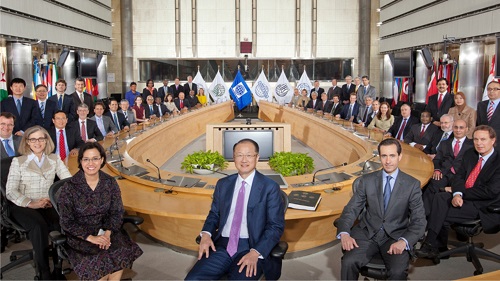Growth in Sub-Saharan Africa rebounds

 World Bank Chief Economist for Africa, Mr. Albert G. Zeufack says Africa’s economic growth recovery has been weak due to wasteful spending in many countries on the Continent.
World Bank Chief Economist for Africa, Mr. Albert G. Zeufack says Africa’s economic growth recovery has been weak due to wasteful spending in many countries on the Continent.
However, he says growth in Sub-Saharan Africa is rebounding in 2017 after registering the worst decline in more than two decades in 2016. Chief Economist Zeufack made the assertion on Wednesday, April 19, 2017, in a live press conference involving African countries with major economic growth that are in the stage of recovery.
The new Africa’s Pulse, which is a bio-annual analysis of the state of African Economies conducted by the World Bank, speaks volumes of how weak the Continent’s growth recovery is.
Africa’s Pulse says the region is showing signs of recovery and regional growth is projected to reach 2.6% in 2017. However, it notes that recovery remains weak, with growth expected to rise only slightly above population growth, a pace that hampers efforts to boost employment and reduce poverty.
Africa’s Pulse: Nigeria, South Africa, and Angola, the continent’s largest economies, are seeing a rebound from the sharp slowdown in 2016, but the recovery has been slow due to insufficient adjustment to low commodity prices and policy uncertainty. Furthermore, several oil exporters in the Central African Economic and Monetary Community (CEMAC) are facing economic difficulties.
According to the analysis, seven African countries, including Cote d’Ivoire, Ethiopia, Kenya, Mali, Rwanda, Senegal and Tanzania continue to exhibit economic resilience, supported by domestic demand, posting annual growth rates above 5.4 percent in 2015-2017.
“These countries house nearly 27 percent of the region’s population and account for 13 percent of the region’s total GDP. The global economic outlook is improving and should support the recovery in the region”, the analysis says.
Africa’s Pulse notes that the continent’s aggregate growth is expected to rise to 3.2 percent in 2018 and 3.5 percent in 2019, reflecting a recovery in the largest economies.
Mr. Zeufack pointed out the environment of weak economic growth comes at a time when the Continent is in dire need of necessary reforms to boost investment and tackle poverty, stressing that countries also have to undertake much needed development spending, while avoiding increasing debt to unsustainable levels.
“As countries move towards fiscal adjustment, we need to protect the right conditions for investment so that Sub- Saharan African countries achieve a more robust recovery”, he says, and adds, “We need to implement reforms that increase the productivity of African workers and create a stable macroeconomic environment. Better and more productive jobs are instrumental to tackling poverty on the continent.”
The Africa’s Pulse analysis released by the World Bank says that with the high poverty rate, the region is faced with the urgent need to regain the momentum in growth and make it more inclusive, which will require deep reforms to improve institution for private sector growth, and develop local capital markets as well as improve the quantity of public infrastructure, enhance the efficiency of utilities including the strengthening of domestic resource mobilization.
[bsa_pro_ad_space id=1]
According to the report, regional growth remains insufficient to raise per capital incomes, and Gross Domestic Product or GDP is projected to contract by 0.1 percent in 2017, before rising moderately by less than 1.0 percent a year in 2018-19.
By Lewis S. Teh-Editing by Jonathan Browne




















